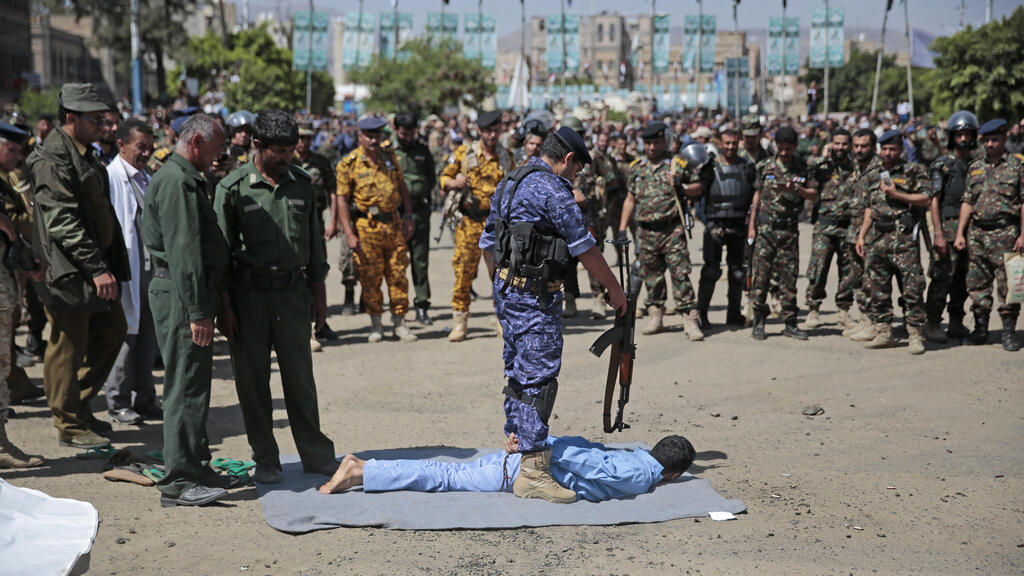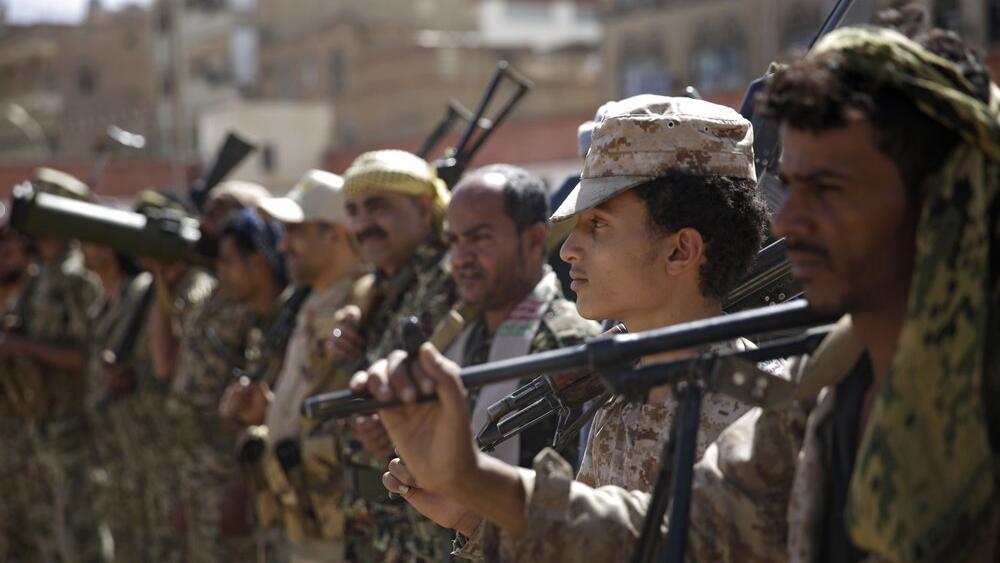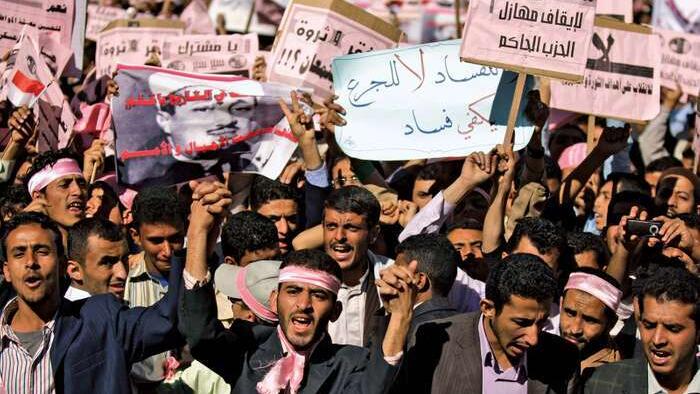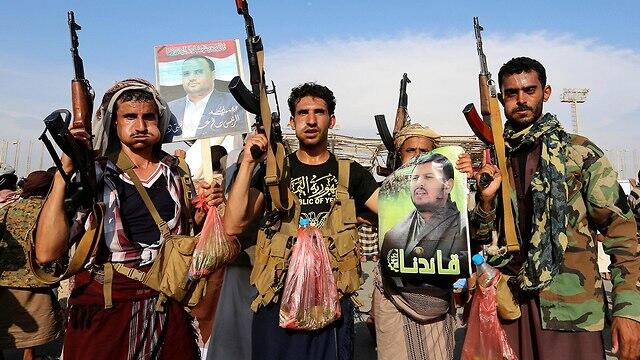Getting your Trinity Audio player ready...
As the devastating, years long civil war in Yemen rages on, university students in Houthi-held areas (known as the de facto authority or DFA) are being forcibly indoctrinated with anti-Israel propaganda and then sent to fight these “enemies” and their allies on the front lines.
The country’s civil war began in 2014 when the Iranian-backed Houthi insurgent group seized control of the country’s capital Sana’a, and in January 2015, forced President Abed Rabbo Mansour Hadi to resign. The following month, Hadi rescinded his resignation from his bolthole in Aden, and in March of that year, a Saudi-led coalition intervened against the Houthis on behalf of his United Nations-backed government.
The unity government that was subsequently created swiftly collapsed, leaving both sides – the Internationally Recognized Government (IRG) and the Houthi insurgents – in open hostility and each controlling swathes of the country. The civil war has created one of the worst humanitarian crises of the modern era, with tens of thousands dying and most of the population suffering from famine.
Now, new compulsory university courses see the DFA bringing the curriculum in areas it controls in line with its ideology.
The course, called “The Conflict with the Israeli Enemy,” is mandatory for all students working towards a bachelor’s degree in public and private universities under the control of the DFA in northern Yemen. This course is taught by DFA-appointed instructors in the first semester of the first year of studies.
The 80-page, seven-unit textbook that accompanies the course uses select verses from the Quran that mention Jews and Christians and interprets them in a way that is aimed at vilifying both religions and mobilizing Muslims against their followers.
The chapter titles include “Who are we and who are they?” “Their truth, characteristics, plans and conspiracies,” “Their methods in targeting us,” “The Holy Quran’s stance on the Jews and Christians and God’s orders for us toward them,” and “The emergence of the Zionist presence at the heart of the Arab nation.”
The citizenship education course promotes the concept that Revolution Day, which is marked on September 26 to celebrate the 1962 creation of the Yemen Arab Republic, and the republican regime itself, are nothing but elements of a system in service to Western nations. It also teaches that before the DFA took over part of the country, Yemen was an agent of the U.S. and Israel. The course also reinforces a culture of conflict with Saudi Arabia and with anyone who disagrees with the DFA.
The course on Israel contains excerpts of speeches and statements by Zaydi Shi’a Muslim religious leader Hussein Al-Houthi, founder of the Houthi movement, who was killed in 2004 by government forces. The course was prepared by a group of professors and falls under the supervision of the Cultural Department of the DFA.
Sally, 22, said that her brother Marwan, who was a student at the Faculty of Commerce of Sana’a University, has abandoned his education to join one of the DFA fighting units in the north of Yemen.
“My brother Marwan didn’t care about politics and war,” Sally said, but the compulsory courses made him “like a bomb” at home and a vehement defender of the DFA.
4 View gallery


An executioner stands over a man convicted of being involved in the killing of senior Houthi official Saleh al-Samad, Saturday, Sept. 18, 2021, in Tahrir Square in Sanaa, Yemen
(Photo: AP)
The change came when Marwan participated in one of the ideological indoctrination courses at Sana’a University, attending multiple lessons and lectures supporting the ideology of the DFA.
Shortly afterward, some eight months ago, he announced he was joining the fighting for the DFA. According to Sally, her brother’s outlook had completely changed.
Sally said that the DFA courses developed internally at the university, along with seminars, events, lectures, and speeches by the former leader of the DFA (a collection of pamphlets called Malazim Al-Sayyid), all brainwashed her brother and “turned him into a fighter and an avid supporter of the DFA.”
The university no longer serves as a place of education, Sally said, and has become “nothing more than a training camp and a facility converting young people into fighters.”
4 View gallery


Houthi rebel fighters display their weapons during a gathering aimed at mobilizing more fighters for the Iranian-backed Houthi movement, in Sanaa, Yemen
(Photo: AP)
She added that her brother had discontinued his university education and now he is on the front lines “while the DFA guarantees the provision of university degrees for him and others like him.”
Abdul is another of the dozens of university students who decided to support DFA ideology after it took control of the university administration, imposed the curriculum on Israel, and held multiple compulsory seminars and lectures.
He, like many others, abandoned his education and joined the fighting against the IRG and the Saudi forces on different fronts along the Yemen-Saudi border – believing they were fighting America and Israel.
Attendance at the courses is monitored by the student unions affiliated with the DFA, students say, and they are told that they must be present for the lectures.
Sana’a is not the only institute teaching these courses. The public universities of Ibb and Amran and twelve others are teaching the two DFA-devised curricula.
Academics and students at these universities say the courses have apparently acceptable titles, but in fact include sectarian ideology in support of the fighting, violence, and the principle of Wilayah (guardianship), which supports the eligibility of the Ansar Allah Houthis to rule Yemen as the descendants of the Prophet Muhammad.
Furthermore, those at the university said, the lectures were being delivered by fighters and military leaders who held no academic qualifications other than those received through their affiliation with the DFA.
Ahmad, an instructor of the course on Israel at Ibb public university, supports the new curriculum and said that it was “necessary in order to build a culture for the new generations away from the culture imported from Western countries.”
He said that the courses were created “to correct the path and strengthen the faith identity that is absent in university students. There is a necessity for building a culture of jihad against America and Israel, and for correcting the misconceptions promoted by the puppet regime,” a reference to the regime of Ali Abdullah Saleh, who preceded Hadi as president.
“The [Israel] course should have existed in the past, the group [DFA] is doing nothing but correcting mistakes that the previous university system had made,” he said.
4 View gallery


Yemeni demonstrators in Sanaa calling for an end to the government in January 2011
(Photo: AP)
After years of conflict between Israel and the Arab world, this course has a high level of support among university students, with the DFA exploiting the hostilities to promote its ideology and win support for its side in the civil war.
Lila, a student at the Faculty of Agriculture at Sana’a University, said that the DFA has also made efforts in recent years to add the curriculum on Israel to her faculty’s course, for which students must study and take a test.
Moreover, some colleges have included DFA-designed courses to be disseminated to students and counted as part of the year’s studies.
“The curriculum included calls for participation in the war and the need for conscription,” Lila said, adding that the curriculum exposes the DFA’s true plans to recruit university students.
Mohammed, a student at Sana’a University, said that the course on Israel was brought in as “a replacement of the Islamic Culture course that incorporated the ideology of the Al-Islah Party,” referring to the Yemeni Congregation for Reform, an Islamist party founded in 1990 with the approval of then-president Saleh.
“The DFA introduced the [Israel] course to strengthen its own ideology with the ideas of fighting the U.S. and Israel while exploiting the passion of Yemeni youths for the cause of Palestine,” he said.
The compulsory studies have now expanded beyond the universities, with the DFA working to inject its ideology in elementary and high schools under its control.
Fadi, a professor of Sociology at Sana’a University, fears that the introduction of such politicized courses for young students could give rise to an entire generation who wholeheartedly support any ideas presented to them, without any argument or critical thought.
“Students are obligated to accept these ideas in order to pass their university courses,” said Fadi “These ideas, alongside seminars, media, and societal pressure may lead to an intellectual trend for young people who support and fight for these ideas.”
The story is written by Mohammed Sayers and reprinted with permission from The Media Line


